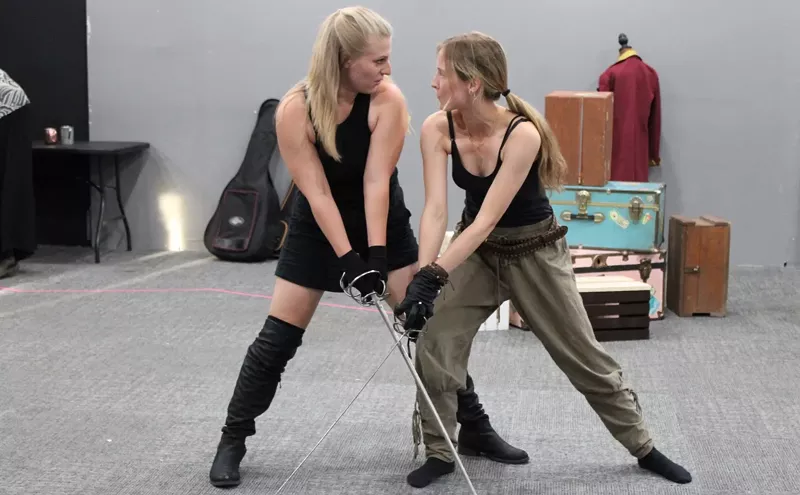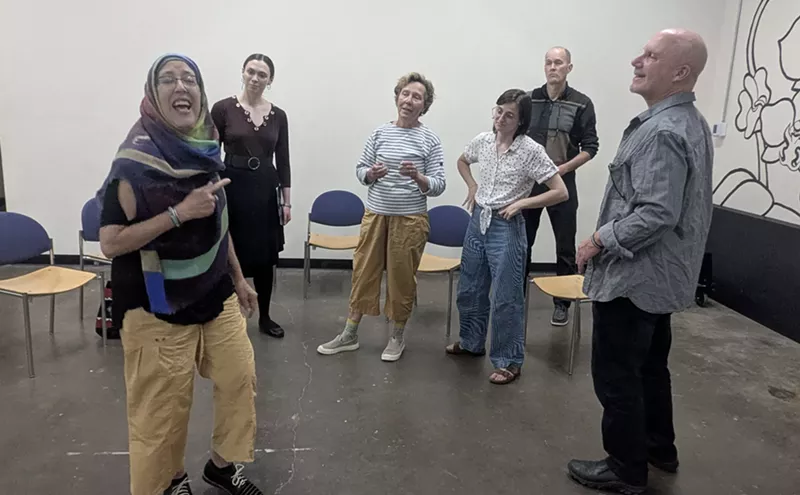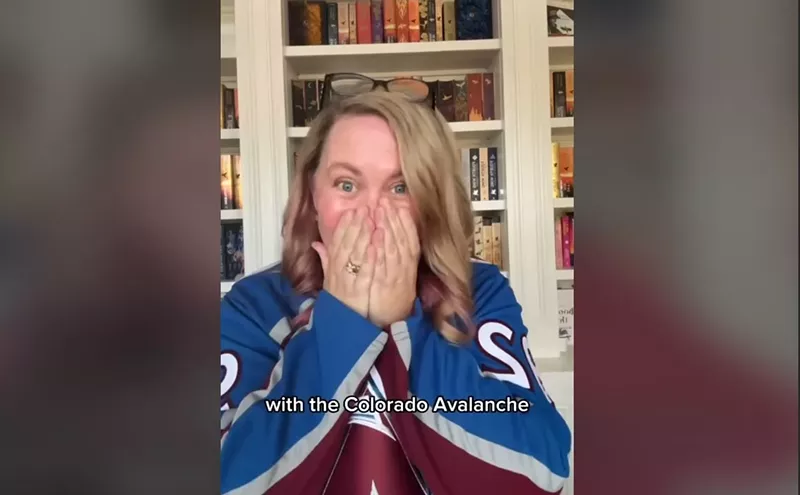See also: Best Name for a Tattoo Shop - Th'Ink Tank Tattoo
Westword: Do you want to go by Fish or your full name?
Fish: Fish is fine. It's definitely the name that I've gone by in tattooing. I've had the nickname since I was a little kid.
Where did it come from?
Kids picking on me when I was a freshman in high school for having big lips. Being a skinny kid with big lips is definitely not, you know -- If it had been like, in 1990, when baby Kate Moss had done her first Calvin Klein add, that standard of beauty didn't really exist quite yet. Having big lips and being thin wasn't quite the thing that it's turned into. I was thirteen, I definitely wasn't as cool as Mick Jagger. So that's where Fish came from. But then, not long after that, there was a certain group of people that kind of used it as a term of endearment and then I kind of really took that and ran with it and started telling people to call me that, so I kind of took control of it and made it into something that I was proud of, as opposed to ashamed of.
It's as much my name as the name my parents gave me. Like, my parents call me Fish. It's funny because my girlfriend has actually suggested that I legally change it to Fish.
Have you thought about it?
Yeah, I have. But then, I really like my given name. You know, it was really interesting. My dad was one of those guys who wasn't into kids, you know, I don't think he was a really big fan of having kids of his own, necessarily. But when my mom got pregnant and he knew that he was gonna be a father and start a family, he kind of put his foot down and was like "Two rules: I will name all of our children, and they will all be raised Catholic."
So I grew up in a kind of oddly Irish-centric, Irish Catholic family. Because of that, because I knew my dad gave me that name -- my dad has since passed away -- it's something that I hold onto pretty tight. Even though I don't go by that name, I won't change it, either. I'm not gonna be like, you can also call me Patrick from now on -- I'm always gonna be Fish. But it's definitely one of those things that I keep that really close to me, you know, for that reason.
Can you tell me a little bit about your background in tattooing and how you got into the industry?
Let's see, it's 2014. I got my first tattoo in '96, it was like a little tribal thing on my upper arm that I actually still have, that I refuse to cover up because it's my first tattoo. During that period of time everybody wanted to look like the surfers from Point Break, with goofy tribal tattoos and stuff like that. So I got that tattoo in May, and then at the end of that same summer in '96, in September, I got my second tattoo. And when I got that tattoo, my best friend and I and we were moving to Northern California. We were moving to Lake Tahoe to do the whole ski bum thing and all that stuff, and it was the day that we were leaving town, so we had all of our shit packed in the car and all that stuff and our parents thought that we were leaving, but instead of leaving town we went straight to the tattoo shop.
He got his first tattoo and I got my second one and we both got tattooed by the same guy, so we were there all day. You know, like, showed up when the shop opened, ate lunch there. He got tattooed and I was drawing and all that stuff, and so I spent the whole day in a tattoo shop -- and spending that whole day not getting tattooed, too. Like I was literally just the person in the shop kind of observing everything that was going on, and it was really intoxicating. I mean, just from the music they were listening to, to the conversations that were going on, it seemed like such an amazingly fun and creative environment. And to know that those guys were busy and they were making good money. At the time I was twenty years old, I had dropped out of college, I'd quit my job working at the outdoor store that I had been working at for a couple years. It's odd now to think about a twenty-year-old and have a total, like, "shit or get off the pot" attitude.
During that winter, I turned 21 and I was definitely like, "I need to figure out what the fuck I'm doing with my life, I need to get on it and have a direction, because this is bullshit." To think about that now, how many 21-year-olds you know have at least that clarity to say, "I need to get off my ass and do something with my life, like, now"?
And so, I spent the whole day in that shop and I remember leaving that night and saying to my best friend, "I think I want to learn how to tattoo." Just like with a lot of other things that I've been like that about in my life, I got obsessed with it. Most tattoo shops didn't have websites and the Internet was still a pretty fledgling thing in '96. So there wasn't all this information out there, so I literally was trying to grab everything I could find, every tattoo magazine I could, went into every tattoo shop I could, just to look around and see. I actually started writing letters back to the shop I got tattooed at in my home town, saying that I would really like to learn how to tattoo. They were really cool about it; they wrote me a letter back that "you need to talk to the shop owner, I can't really help you out with that, but when you get back to town, if you want to talk to her, go for it." So that's exactly what I did.
I tried to draw as much as I could during that winter. When I got back to town at the end of that season, it was May, something like that, and I went in and I was like, "I want to learn how to tattoo." And she said, well, "No. We're too busy right now, we don't have time to take on an apprentice. We just finished another apprenticeship. Why don't you come back in the fall? Spend the summer drawing, draw as much as you can."
And so that's exactly what I did. And I was getting tattooed at the time too, so I was in that shop getting tattooed and I was coming in every two or three weeks, something like that, to get tattooed. I was working on a pretty big tattoo, so I spent a fair bit of time in that tattoo shop that summer. I took her advice and I didn't talk to them about learning and shit like that that much, I just kind of kept my mouth shut. So end of the summer comes around and I go back and I'm like, "Okay, summer's over. How about it? Are we gonna do this thing or not?" She was like, "Nope. Sorry, still too busy, still just not ready to take on an apprentice right now. Maybe check back at the end of the winter."
At that point I was really like, "Listen, I've been waiting to do this for X amount of time, I've done what you asked me to do, I've not bugged you about it." And I said, "Lady, come hell or high water, I'm gonna learn how to tattoo, whether you teach me or not. I want to learn from you, there's nobody else in this town that I want to learn from, but it makes no goddamn difference to me whether you're the one who teaches me or not -- I'm gonna learn. Even if it means I have to teach myself, it doesn't make a difference."
That at least impressed her. She was like: "I'll tell you what, I'll make you a deal. You can come into the shop as much as you want, you can ask as many questions as you want, I'll try to help you out as much as I can. Help out a little bit around here, I'll help you get some equipment, that's the best I can do for you." I was like, "Okay, deal." And so I came in every day, every single day. That lasted maybe two months, and it was finally October-ish before she said, finally, "Okay, if you want to tell people you're apprenticing, you are. You've earned it." That was about October and then my apprenticeship lasted through that year into the next year, until about the following February. So it was about a year and a half, or so. Continue reading for more of the Q&A with Fish. What was interesting was, I was working a full-time job at the time. So I would get done with my day job at five o'clock, I'd go home, change my clothes, get in the car, drive 45 minutes to the tattoo shop every single day. Basically, every day the routine was the same. I would get in there, I would take out the trash, collect everybody's dirty needles, run the autoclave, go downstairs, scrub tubes -- every single day. So most of my apprenticeship was spent in a dirty basement, alone, scrubbing tubes, not being around tattooing, not being around all the other things. Granted, I will also say -- and I'll get to this part of the story in a second -- that my apprenticeship was exactly what it needed it to be. But a lot of it, at the time I was 21-years-old, 22-years-old, I'm a kid. And all my best friends were in college, they were doing the college thing, like going out, having fun, meeting girls and yada yada. And, you know, I was a hardcore kid, so I wanted to go to shows all the time. It was hard to keep a 21-year-old focused, you know what I mean? If you're kind of letting them run around on their own.Even though this was really what I wanted and I was really determined to do it, I'm also someone who has a tendency to lose focus if I'm not, like, reined in. So that's kind of what started to happen, is I would lose focus and was spending a little bit too much time screwing around with my friends and things like that. Some of the people at the shop started to get kind of aggravated about it, and then she got wind of the fact that I was planning on moving. When my apprenticeship was over, I was gonna move. And she got real torked about that. She was like, "What the hell is this? I gotta hear this from somebody else that you're gonna leave?"
I defended myself, like part of the deal with the apprenticeship was that she was like, "When you're done with this, you gotta go. There's no room for you here. I'll apprentice you but, when you're done, that's it, you gotta go." And I come to find out that was not actually gonna be the case. You know, because a lot of the time that's what you get paid back from an apprentice. You don't charge your apprentice. Anyone that charges for an apprenticeship is somebody who shouldn't be doing it in the first place. The way you get your investment back is having that person work for you. And I did, obviously, the whole time. I was there cleaning the shop every day, doing all the shit work that they don't want to do. I mean, that's worth something, for sure, because if I'm not there doing it, then they have to. But then, like, you make the money back too, by having them work for you and all that stuff.
So I realized that she had had every intention of having me stay and making her money back, at least to some degree. So when she found out that I was planning on leaving, she was like, "I'll tell you what, I've been getting a lot of shit from everybody else here about you and the fact that you're not taking this seriously enough. Why don't you just go ahead and get your stuff and go?" And she fired me.
And I'm a pretty sensitive kid. So she got really upset and she started to kind of cry, and then I started crying, we were both crying. It was pretty intense. We were both really sad about it. But one of the things she said to me was, "You really need to figure out if this is really want you want to do." And then I went home and I really thought about that. Like, "Is this what I want?" And then I was like, "Fuck you, I'm not gonna spend the last two years of my life trying to learn how to do this and go through all the work to get here to fucking quit on it. There is no way. I refuse."
Again, I got super-motivated. I made a deal with her where I could come and use the equipment at the shop, the autoclave and all that stuff, so I could still sterilize all my stuff and still do tattoos safely and properly. I set up like a little tattoo station in my room at my parent's house and did every tattoo I could. I drew non-stop. I almost got fired from my day job a couple times for drawing. They kind of started to know that if I didn't talk for more than five minutes, they knew exactly what I was doing. They'd just scream, like, "Fish, stop drawing!" I got sent home once, they were like, "You're done for the day, get out of here." Because I'd literally draw non-stop.
And so, you know, I did every tattoo I could and made a little portfolio and did a kind of flash and got this stuff together and came up to Boulder because that's where we figured out we wanted to move to. We had friends that lived there and, you know, I went around and I found myself a job. There's a shop on the Hill in Boulder called Tribal Rites and they liked me and they were like, "Yeah, we need another tattooer, it's yours if you want it." And that was it.
I was back in Rochester at that point when they offered me the job. I think that was April and then we moved out like the first week of June. I think I started working within the first two days or so of me being in Colorado. And that was it; I was a professional tattoo artist.
There's been lots of ups and downs and all that stuff ever since. I will say this, tattooing has been the thing that has given me every good thing -- I shouldn't say every good thing -- or almost every good thing I've gotten in my life, at least as an adult. Tattooing has given me so much. It's really special.
You mentioned when you got started tattoo shops didn't even have websites; what are some other aspects of the industry that are different now from when you began?
Tattooing, when I started, even though I got into it later than a lot of people did, tattooing was really blowing up in the '90s, but definitely not to the degree that it has in the last ten years. At the time that I got into it, so much of it was legitimately word of mouth, very oral tradition. There was still a good amount of mystery to it. Tattoo shops were still scary places to come, you know, where you would still get chased out with a fucking baseball bat. That world was a serious deal, you didn't screw around in a tattoo shop, whether you were somebody that was trying to learn, like I was, or you were just a customer. Tattoo shops where those places that were awesome to be at, but always had a little element of danger. But In the fifteen-plus years or whatever -- I'd say the twenty years that I've been around tattooing at this point -- it has changed immensely.
The thing is that tattoos aren't scary anymore. Tattoos aren't a mystery anymore. The veil has been completely pulled back. You know, the curtain's pulled back, you saw the wizard for what he really was, it's all gone. In some ways that's good, because so much of the stuff has become so readily available to anybody that's involved in tattooing. All the reference material you would ever want is there, all the information you would ever want in the world is all there for the taking, and because of that, it's really kind of proved who's in and who's not. It's like, everything has gotten so easy to take advantage of, if you're not taking advantage of it, that's sad because it's right there. But then it's also really pushed people to have to work a lot harder. There's kids wgi are tattooing that have been tattooing for like three years, but look like they've been tattooing for ten. Because they don't have to work at figuring anything out, it's all right there, it's right in front of them. And so that's made the rest of us who have been in it for longer have to really work harder and stay hungry. Because I've always said -- about lots of different types of things -- that no matter how good you think you are, there's always somebody out there who's younger and hungrier and better than you. There's always gonna be somebody out there who wants it more than you do and is better than you at it already.
To go through the list of the ways tattooing has changed, I'd talk your ear off for an hour. But just think about the fact that you've got, you know, soccer moms or PTA moms who have full sleeves. I tattoo my dermatologist, you know what I mean? Tattooing is for everybody, which in a lot of ways is good and in some ways it's kind of bad. But I think that the explosion in popularity of tattooing has been, generally speaking, overwhelming. Just look at the fact that there's the amount of tattooers now who are working and that are able to support themselves tattooing. Obviously, we're all competing. There's only so much in a pie and we're all competing for a piece of the pie. And every time you add another mouth on the table, everybody gets a little bit less, but that's not necessarily a bad thing, either. That makes us all have to want it more and fight harder for it, and that's good. It keeps the lazy people out, and the shitty people out. Continue reading for more of the Q&A with Fish. What's your favorite style of tattoo to do?I really enjoy American traditional. I should say that what I really like to do is kind of a blending of things that are more illustrative and more detail-oriented, with a little bit more of those American traditions of tattooing -- bolder, more simple, like having that really nice juxtaposition of things that are really rendered and things that are really simple. There's a definite group of people who fall in that category, who are doing those types of tattoos. There's not a particular subject matter, necessarily, to say that I do Japanese or I do Celtic or I do black and gray or I do portraiture or something like that. I do all kinds of stuff, but the stuff that I like to do most is when, stylistically, I get to blend those two things.
I read on the shop website that you're going to move to San Francisco, is that correct?
Yeah, I'm actually starting that process here in the next couple of weeks, I'm moving all my stuff out and then I will be out there permanently as of the second week of March. My girlfriend got an amazing job offer to work with a tech company out there, and it was an opportunity -- it took us a while really to figure out. It was a decision that took, like, a solid three weeks, almost a month, between the time they offered her the position and the time that she said yes to really make the decision to do it, just because it's a really big deal for anybody under any circumstances. Especially for me, because I have basically spent my entire career here in Colorado, and made a decision at some point to really focus my energy here and say that this is where I live, this is where I work, I want to make sure that I have the best possible business here.
The only other place that I have a decent book of business is New York City, you know, because I was traveling up there, I was gonna move there at one point. San Francisco was really scary because I had never tattooed in San Francisco -- I have now, but at the point when we were deciding to move I hadn't -- and I don't really know a lot of people out there and San Francisco is the capital of tattooing in North America. It has more talent in that city than any other city in the country, except for New York, with a population that is like one eighth the size.
And to think about, if you have a population of seven million versus a population of one million, what percentage of the population in any space is gonna get tattooed? So, call it ten percent. Ten percent of seven million is a shit ton more people than ten percent of one million. And then when you literally have the same amount of talent, not to mention all the other people out there who are doing it that are terrible or mediocre at best who are trying to cut into that pie. Because of the talent that is there, San Francisco definitely turns its shoulders to newcomers pretty hard, and it's been a very cold place to try to break into.
It's hard because you're going into a situation where you're nervous about it to begin with, and all the people that you know out there are all people who you have grown up, as a tattoo artist, respecting and following and admiring from afar. And now it's like, they're there in person and they're going to be the people who I'm trying to potentially work with or work in the same city as. And when those people are kind of, like, "Who are you?" And you're like, "Dude, I've been tattooing for fourteen years and I'm booked up for three months at a time at home and here's my portfolio." So what? Now you're where that doesn't mean shit. So it's been a really interesting thing.
So yeah, I am really excited, I am nervous but I am really excited to have a new chapter in my life. And I'm honestly really excited to be challenged and have to work really hard. For as scared as I am about what it's gonna be like to work in San Francisco as a tattooer, I'm definitely excited about the challenge. I think it's something that -- I think the term "resting on your laurels" a lot of times gets a bad rep, to think about the fact that you are just benefiting from the fruits of your labor, and that's not bad. Like, why should you feel bad about that? But at some point, does that encourage complacency?
I've worked really hard to make sure that everybody here knows that I value every single one of my clients. I actually develop a lot of pretty significant personal relationships with a lot of people I tattoo, and I value that a ton. And I have to really try to make sure that everyone I tattoo knows that in no way does my moving to San Francisco mean that you should not think of me when it comes time for you to get a new tattoo, and that as long as you want me to continue to do your tattoos, as long as you're serious about it, I will make sure that I make myself available to you. So right now I'm moving out there and I'm gonna be back four times, between the time that I leave and the end of the year, four trips for ten days a piece.
Is there anything you're gonna miss about living in Denver?
Oh, yeah, obviously. The people and the interpersonal relationships that I have here -- my childhood best friend, the person I moved with to Colorado, the person I've done pretty much every significant thing in my life with, is staying. That's one of those situations where it's somebody who is closer than blood. Leaving him here is definitely pretty hard for me, for both of us.
I'm trying to think. I will definitely miss the Mexican, for sure. We've got some of the best Mexican food in the country. You think about California Mexican, but they don't know what green chile is or anything like that. Ironically, even though I'm gonna be living in California, I'm gonna miss the sunshine and our proximity to the mountains.
I think that Denver is always gonna be a small city that wants to wear bigger pants, that wants to be big. And I think that, because people want it to be big, people will always be hungry for new and interesting things. And I think that it's a place that, it's nice to feel that you can be a part of that, it's nice to feel that you can be somebody who really has something to offer to the overall culture. And that people are so desperate for things that are thought-provoking and interesting that are done here that people really appreciate that a lot. Especially the fact that I started a men's clothing line, about a little over than five years ago, with my childhood best friend. We're a Denver, Colorado-based menswear line and people have appreciated that; it's been nice to feel like you can give that. And it's not like the support that we've gotten from the local community is something we couldn't function without, but it is a situation where it feels really nice to be able to do things that makes the community feel special, that makes the community stand up and notice. That is definitely something that I'm gonna miss. And then the cost of living, too. The cost of living fucking makes the quality of life you have here unbelievable.
Is there anything else you want to say?
Th'ink Tank has been in the community eleven years now. And, you know, we went from being the new kids on the block and everybody kind of hating us for a little bit, we opened up in LoDo in a huge space and had crazy big art shows and all this stuff, and everybody kind of thought it was gonna be a flash-in-the-pan type of thing. But we have been a tattoo shop going on eleven years, and have had the privilege of having some of the best artists in the state come through our doors and be a part of this shop. Every single person who has ever done a single tattoo in this building and been a part of this shop has contributed to making it the shop that it is. And the fact that after eleven years we are still one of the nicest, busiest, biggest, most respected shops in the city and definitely the state, that is something that we are all really thankful for. And not thankful for just the people who come in here and want to get tattooed here, but really thankful for the people who have worked here and made that possible, too, both the people that are still here and the people that have gone to do other things.
We could not be more appreciative of the loyalty and support we've received from the city and the community as a whole. We really hope that continues and that Denver can stand by us as we continue to grow and get better all the time.
For more information, visit Fish's artist website and Instagram account.
Follow @WestwordCulture












